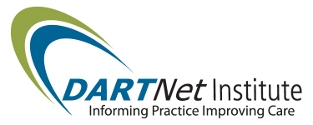DATA QUEST CONNECTS PRIMARY CARE CLINICS IN WASHINGTON AND IDAHO TO DRIVE HEALTH DISCOVERY
Learn more about Data QUEST development, processes, and governance
Publications:
Cole AM, Stephens KA, Keppel GA, Estiri H, Baldwin LM. Extracting Electronic Health Record Data in a Practice-Based Research Network: Processes to Support Translational Research across Diverse Practice Organizations. EGEMS (Wash DC). 2016;4(2):1206.
Lin CP, Stephens KA, Baldwin LM, Keppel GA, Whitener RJ, Echo-Hawk A, Korngiebel D. Developing Governance for Federated Community-based EHR Data Sharing. AMIA Jt Summits Transl Sci Proc. 2014;2014:71-6. eCollection 2014.
Cole AM, Stephens KA, Keppel GA, Lin CP, Baldwin LM. Implementation of a health data-sharing infrastructure across diverse primary care organizations. J Ambul Care Manage. 2014 Apr-Jun;37(2):164-70.
Stephens KA, Lin CP, Baldwin LM, Echo-Hawk A, Keppel GA, Buchwald D, Whitener RJ, Korngiebel DM, Berg AO, Black RA, Tarczy-Hornoch P. LC Data QUEST: A Technical Architecture for Community Federated Clinical Data Sharing. AMIA Jt Summits Transl Sci Proc. 2012;2012:57-62. Epub 2012 Mar 19.
Lin CP, Black RA, Laplante J, Keppel GA, Tuzzio L, Berg AO, Whitener RJ, Buchwald DS, Baldwin LM, Fishman PA, Greene SM, Gennari JH, Tarczy-Hornoch P, Stephens KA. Facilitating health data sharing across diverse practices and communities. Summit Transl Bioinform. 2010 Mar 1;2010:16-20.
RESEARCH PROJECTS USING DATA QUEST INCLUDE:
Observational Studies
Incidence of Alcohol Use Disorder (AUD) Diagnosis and Treatment
This study evaluated the incidence of AUD and alcohol-related medical diagnoses, use of FDA-approved and off-label AUD medications, and use of behavioral health services. Funded by the Pacific Northwest Node of the NIDA Clinical Trials Network.
Publications:
Hallgren KA, Witwer E, West I, Baldwin LM, Donovan D, Stuvek B, Keppel GA, Mollis B, Stephens KA. Prevalence of documented alcohol and opioid use disorder diagnoses and treatments in a regional primary care practice-based research network. J Subst Abuse Treat. 2020 Mar;110:18-27.
Chronic Disease Management for Patients with Substance Use Disorders
This study explored whether primary care patients with chronic diseases (i.e., hypertension, diabetes, obesity) have worse outcomes if diagnosed with a substance use disorder, and sought to identify predictive factors associated with good outcomes in chronic disease management, including integrated behavioral health services. Funded by the Pacific Northwest Node of the NIDA Clinical Trials Network.
Publications:
Service Utilization and Chronic Condition Outcomes among Primary Care Patients with Substance Use Disorders and Co-Occurring Chronic Conditions. J Subst Abuse Treat. 2020 Mar;112S:49-55
Identification and Characterization of Patients Prescribed Statins and Warfarin
This study explored the capacity of electronic health record (EHR) data to describe cohorts of patients prescribed statin medications warfarin, and to identify cohorts of patients with evidence of adverse events related to prescription of these medications. This project was supported by the National Institutes of Health under Awards Number UL1 TR000423 and U01 GM092676-05.
Publications:
Use of electronic health record data from diverse primary care practices to identify and characterize patients prescribed common medications. Health Informatics J. 2020 Mar; 26(1):172-180.
Antibiotic Prescribing for Children in Family Medicine Clinics
Publications forthcoming…
Longitudinal Epidemiologic Assessment of Diabetes Risk (LEADR)
This study created an electronic health record-generated patient cohort to study progression to diabetes and related morbidity, and examine the role that access to and delivery of preventive care has in the prevention and control of diabetes. Funded by the Centers for Disease Control.
More information:
https://www.cdc.gov/diabetes/research/applied.html
Publications:
Fishbein HA, Jeffries Birch R, Mathew SM, Sawyer HL, Pulver G, Poling J, Kaelber D, Mardon R, Johnson MC, Pace W, Umbel KD, Zhang X, Siegel KR, Imperatore G, Shrestha S, Proia K, Cheng Y, McKeever Bullard K, Gregg EW, Rolka D, Pavkov ME. The Longitudinal Epidemiologic Assessment of Diabetes Risk (LEADR): Unique 1.4 M patient Electronic Health Record cohort. Healthcare. 2020 8(4).
How Well are Contraceptive Guidelines Followed (CoACHD)
This study measured adherence to national contraceptive guidelines among women of childbearing age, and assessed the validity of contraceptive data from the EHR compared to manually abstracted data. Funded by the Institute of Translational Health Sciences Community Partners in Research Pilot Grant.
Publications:
Godfrey EM, West II, Holmes J, Keppel GA, Baldwin LM. Use of an electronic health record data sharing system for identifying current contraceptive use within the WWAMI region Practice and Research Network. Contraception. 2018;98(6):476–481.
Clinical Trials
Integrating Behavioral Health in Primary Care (IBH-PC)
This study implements and evaluates specific practice improvement strategies to generate a greater degree of behavioral health-primary care integration than usual, co-located behavioral health and primary care. Funded by the Patient Centered Outcomes Research Institute.
Publications:
Crocker AM, Kessler R, van Eeghen C, Bonnell LN, Breshears RE, Callas P, Clifton J, Elder W, Fox C, Frisbie S, Hitt J, Jewiss J, Kathol R, Clark Keefe K, O’Rourke-Lavoie J, Leibowitz GS, Macchi CR, McGovern M, Mollis B, Mullin DJ, Nagykaldi Z, Natkin LW, Pace W, Pinckney RG, Pomeroy D, Pond A, Postupack R, Reynolds P, Rose GL, Scholle SH, Sieber WJ, Stancin T, Stange KC, Stephens KA, Teng T, Waddell EN, Littenberg B. Integrating Behavioral Health and Primary Care (IBH-PC) to improve patient-centered outcomes in adults with multiple chronic medical and behavioral health conditions: study protocol for a pragmatic cluster-randomized control trial. Trials. 2021 March; 22(200).
Model Agnostic Framework for Integrated Behavioral Health
Stephens KA, van Eeghen C, Mollis B, Au M, Brennhofer SA, Martin M, Clifton J, Witwer E, Hansen A, Monkman J, Buchanan G, Kessler R. Defining and measuring core processes and structures in integrated behavioral health in primary care: a cross-model framework. Transl Behav Med. 2020 Aug 7;10(3):527-538.
In the news:
Kari Stephens, PhD, Associate Professor and Director of Clinical Research Informatics in the department of Family Medicine at the University of Washington, recently spoke with Healio Primary Care about the Integrated Behavioral Health (IBH) Cross-Model Framework, published in Translational Behavioral Medicine, that she and fellow researchers developed to support behavioral health in primary care clinics. Recognizing the need for a common definition across the various models of IBH, the research team created this framework as a cross-model definition of IBH in primary care that includes evidence-based processes and structures. The framework has been adopted by Minnesota’s MN Health Collaborative and published as a key community standard in their “Call to Action”. In partnership with the Collaborative, the research team evaluated the real-world usability of the framework in a state-wide effort detailed in published journal article.
To learn more about the importance of the framework, what it entails and more read the full article here: Framework helps primary care practices integrate behavioral health
Team-Based Safe Opioid Prescribing
This study implemented and evaluated a “team-based best practices” approach to safe opioid prescribing for chronic non-cancer pain across 20 rural health clinics. Funded by the Agency for Health Care Research and Quality.
Publications:
Six Building Blocks: A Team-Based Approach to Improving Opioid Management in Primary Care. Content last reviewed February 2020. Agency for Healthcare Research and Quality, Rockville, MD.
Parchman ML, Penfold RB, Ike B, Tauben D, Von Korff M, Stephens M, Stephens KA, Baldwin LM. Team-Based Clinic Redesign of Opioid Medication Management in Primary Care: Effect on Opioid Prescribing. Ann Fam Med. 2019 Jul;17(4):319-325.
Informatics Research
Patient-Centered Scalable National Network for Effectiveness Research (pSCANNER)
This study developed a stakeholder governed federated network of electronic health data as part of PCORnet, a national patient-centered clinical research network. UW developed an online website to improve health communication for patient and clinical stakeholders using the pSCANNER network. Funded by the Patient Centered Outcomes Research Institute.
Publications:
Stephens KA, Osterhage KP, Fiore-Gartland B, Lovins TL, Keppel GA, Kim KK. Examining the Needs of Patient Stakeholders as Research Partners in Health Data Networks for Translational Research. AMIA Jt Summits Transl Sci Proc. 2019;2019:363-369. eCollection 2019.
Leaf: An Open-Source, Model-Agnostic, Data-Driven Web Application for Cohort Discovery and Translational Biomedical Research
Leaf, a successful production-supported tool at the University of Washington, collaborated with DataQUEST to develop a proof of concept use case for a multisite version of Leaf and a live OMOP network, yielding improved speed and self-service of cohort discovery within the Data QUEST Coordinating Center and the potential to support Leaf for community partners. This project was supported by the National Center for Advancing Translational Sciences, National Institutes of Health, through Grant Number UL1 TR002319
Publications:
Dobbins NJ, Spital CH, Black RA, Morrison JM, de Veer B, Zampino E, Harrington RD, Britt BD, Stephens KA, Wilcox AB, Tarczy-Hornoch P, Mooney SD. Leaf: an open-source, model-agnostic, data-driven web application for cohort discovery and translational biomedical research. J Am Med Inform Assoc. 2020 Jan 1;27(1):109-118.
Data Quality
Data Quality Testing Tools and Procedures
A series of studies have been used to define standardized data quality procedures and develop a tool to test electronic health records data as it is refreshed in a data sharing infrastructure. These studies were supported by the National Center for Advancing Translational Sciences, National Institutes of Health, through Grant Number UL1 TR002319
Explore data quality tools on GitHub
Publications:
Estiri H, Stephens KA, Klann JG, Murphy SN. Exploring completeness in clinical data research networks with DQe-c. J Am Med Inform Assoc. 2018 Jan 1;25(1):17-24.
Estiri H, Stephens K. DQe-v: A Database-Agnostic Framework for Exploring Variability in Electronic Health Record Data Across Time and Site Location. EGEMS (Wash DC). 2017 May 10;5(1):3.
Estiri H, Chan YF, Baldwin LM, Jung H, Cole A, Stephens KA. Visualizing Anomalies in Electronic Health Record Data: The Variability Explorer Tool. AMIA Jt Summits Transl Sci Proc. 2015;2015:56-60. eCollection 2015.
TEAM
KARI STEPHENS

Kari Stephens, PhD, is the Director of Data QUEST and a clinical psychologist and biomedical informaticist with the UW Psychiatry and Behavioral Sciences and Biomedical Informatics and Medical Education departments. Her research has two substantive areas, namely: 1) treating populations affected by violence and trauma and 2) electronic health record data sharing to improve health in disadvantaged populations. Her goal is to improve health at a population level using both evidence-based behavioral treatments where and when they have the most reach and potency while leveraging the power of big electronic health data.
MARGARET AU

Maggie Au, MS, is a Biostatistician and Research Scientist in the UW Department of Family Medicine. She collaborates on Data QUEST research as an analyst and supports data quality for the Data QUEST data repository.
LAURA-MAE BALDWIN

Laura-Mae Baldwin, MD, MPH, is a practicing family physician, a Professor in the UW Department of Family Medicine, and the Founding Director of the WWAMI region Practice and Research Network (WPRN). Several WPRN practices are members of Data QUEST. Dr. Baldwin’s research interests and expertise are in rural health, quality of care, and cancer prevention. Engagement Focus: WWAMI region Practice and Research Network (WPRN)
ALLISON M. COLE

Allison Cole, MD, MPH is an Assistant Professor in the UW’s Department of Family Medicine. Dr. Cole is the Co-Director of the Institute of Translational Health Sciences’ Community Engagement Core, and Director of the WWAMI region Practice and Research Network (WPRN). Dr. Cole’s research interests include cancer prevention and screening, and health disparities. Engagement Focus: WWAMI region Practice and Research Network (WPRN)
BRENDA MOLLIS

Brenda Mollis, MPH, MPA, MA, is a Research Scientist in the UW Department of Family Medicine. She is the operational lead for Data QUEST, and works with academic investigators to facilitate work with community-based practices. Currently, her research work focuses on integrated behavioral health in primary care, and substance use disorders.
MARIA PRADO

Maria Prado, MPH, is a Research Coordinator in the UW Department of Family Medicine. She supports the Data QUEST infrastructure and operations, and supports researchers in defining data specifications and facilitating data extraction and transfer.
BAS DE VEER

Bas de Veer, MS, is the UW Biomedical Informatics (BMI) Services Manager. He is a medical informatician who specializes in bridging the gap between the worlds of medicine and informatics. Bas has expertise in software implementation, training, user experience, and research consulting. As the manager of the of the BMI services group, he oversees the REDCap installation of more than 8,500 users for the ITHS and the provision of other research data services.
IMARA WEST

Imara West, MPH, is a Research Scientist with UW Department of Psychiatry and Behavioral Sciences and the Department of Family Medicine. She leads data quality and data curation efforts in the data warehouse. Additionally, she conducts statistical analysis and extraction of data from the Data QUEST data warehouse.
The WPRN is a collaborative group of over 80 primary care practices in the five-state WWAMI region (Washington, Wyoming, Alaska, Montana, and Idaho) committed to research and practice improvement. Its mission is to improve the health and well-being of patients in their communities through the conduct of collaborative research that informs and enhances primary care clinical practice. The WPRN’s diversity of geography and practice type allows it to reach many rural and underserved populations. WPRN Data QUEST practices are located in rural and urban Idaho and Washington State.
WPRN Data QUEST clinic characteristics:
• Community Health Centers and Rural Health Centers
• Clinics range from less than 6,000 to 55,000 patient visits/year
• Clinics are in towns and cities of varying sizes, with populations of smaller than 1000 to over 200,000.
The DARTNet Institute is a rapidly growing collaboration of practice-based research networks that are building a national collection of data from electronic health records, claims, and patient-reported outcomes. The networks blend quality improvement, effectiveness, and translational research with a data-driven learning system. The learning system includes advanced performance measures and assistance with the development and deployment of clinical decision support systems. The WPRN is a close collaborator with the DARTNet Institute and can help facilitate research projects across the sister networks to allow for much broader national representation and diversity in populations needed to drive innovative health discovery.
SPONSORS
The Institute of Translational Health Sciences offers resources that increase the speed at which scientific discoveries can be translated into treatments and clinical practices that improve health outcomes for patients and communities. More than 6,000 researchers from nearly 200 different institutions across the five-state WWAMI region have collaborated with us to attract grant funding, build their research teams, develop research tools, move research projects forward, and engage with patients and the community. Learn more at www.iths.org.






